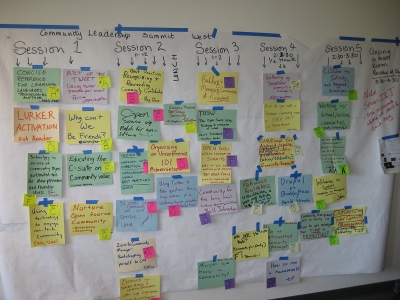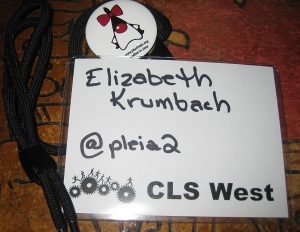If someone had told me 5 years that I’d be attending a “Community Leadership Summit” I probably would have laughed. As far as community leaders go I was a pretty reluctant one, I’m shy and an introvert, certainly not the poster child for charisma. I make my living as a Linux Sysadmin, not strictly a profession you associate with community leadership. But it turns out that for all my initial reluctance, I enjoy it and I want to be as good at helping the community as I am with deploying a new server cluster, so on the 15th I found myself at West Coast Community Leadership Summit (CLS West).
This was my first unconference and I have to admit that I had some skepticism about the format. Discomfort grew as everyone who introduced themselves to me worked as some kind of Community Manager for a living.
Luckily all this discomfort melted away as people proposed topics and the schedule quickly filled up to give us a full day of interesting sessions that I felt I could learn from and contribute to.

The first I went to was on “Lurker Activation” within communities. The discussion started out with some casual statistics about the overwhelming number of “lurkers” within any given community (defined as people who visit a community site regularly but don’t contribute by signing up and/or contributing content of any kind). Estimates were from 90-99% depending on the community. A major point brought up in the session was that getting a majority of the lurkers activated is impossible, the number will always be high, but there are a lot of things you can do to help make people more active, including:
- Making project management transparent (no more of those private conference calls with core contributors, if you do most of your communicating on IRC – have your meetings there too, in public)
- Remember that even as a community leader or manager, you are still a part of the community (top down dictators need not apply)
- Have a clear mission and stick with it
- Lower barrier to contributions as much as possible without sacrificing project/community integrity
- Get rid of site-specific registration (use openid, facebook connect, and twitter and whatever else is popular)
It was also interesting hearing from a woman who is a self-proclaimed “professional lurker” who will read (and pass along information privately to friends) but won’t sign up and won’t reply to threads. Some of the features she said were appealing where things like the ability to up/down vote something without registration and things like Netflix’s polls which simply emailed you a link which you could quickly click on a reply to and have nothing else bother you (no additional clicking, no piles of text to read, just a simple “thank you” and you have the expectation that such a simple action was helpful).
The next session I went to was “Best Practices: Recognizing and Rewarding Community Contributors”
We were fortunate to have Randy Farmer in this session, one of the authors of Building Web Reputation Systems (you can get an idea of his book from his Google Tech Talk on the subject – I just watched it myself tonight). He helped the session start off on a good foot by defining the criteria of our discussion with three broad types of contributors: altruistic, egocentric and corporate. Different communities respond differently to different incentive systems so you really need to know your communities before seeking to apply one. It was fascinating to hear from others what their communities use and the success or failures they’ve had. One of my fellow Ubuntu California Team members was also there and we were able to talk a bit about the successes and failures thus far in the Ubuntu community with regard to reward systems (Travel sponsorships to summits and Ubuntu Membership with perks that have value in a technical community? Great! Launchpad karma? Not so much.). But perhaps the most interesting discussion for me that came out of this was the discussion regarding hiring practices. In some ways it’s encouraging to know that a company behind a community project hires from the community, but it can backfire when you over-hire (all of a sudden ALL the projects in the community are led by employees) or community members start feeling embittered and that they are entitled to jobs for doing the same work that their former peers are now being paid for.
After this session we had lunch, which was a lovely spread of Indian food – if a bit on the spicy side for some of the attendees.
It was then on to “Building and Managing Communities of Minorities” for a fascinating look at the similarities that all communities of minorities face. In addition to having other women in tech representation (including the amazing BJ Wishinsky of the Anita Borg Institute and a representative from Oracle looking for tips for the Duchess women in Java community) we had folks from online and offline ethnic communities, an accessibility community representative and a champion of LGBT communities. We quickly discussed why these communities exist, the typical life cycle (serving our core first, and often later working beyond the charter to help other, similar groups), the challenges we face (including divisions and arguments within our own communities) that are remarkably similar across minority communities. Sheryl Sandberg’s TED talk Why we have too few women leaders was also mentioned during the discussion which I finally was able to watch tonight, very good!
The last session I attended of the day was “Hi, I’m an Introverted Community Manager” and I wasn’t quite sure what to expect. The session ended up being a bit funny because people who were open in other sessions let shyness show through. I have to admit not getting a whole lot out of this session (introductions ran a bit long), but it was nice knowing that I’m not the only introvert who is in the position of being a community coordinator/manager/leader. Now I just need to figure out how to tell my fellow Ubuntu friends how vital the lonely “recharge” time after each day at UDS is!

The evening wrapped up with a big community gathering at a loft on Mission. The acoustics in the venue weren’t great for quiet discussion, but I managed to have some awesome discussions, including lots of excellent geek talk with one of the MAKE bloggers. And it was a delight to finally meet and chat with Marsee Henon, the manager of the User Group and Professional Associations program at O’Reilly who I’ve worked over email for the PhillyChix since 2003.

